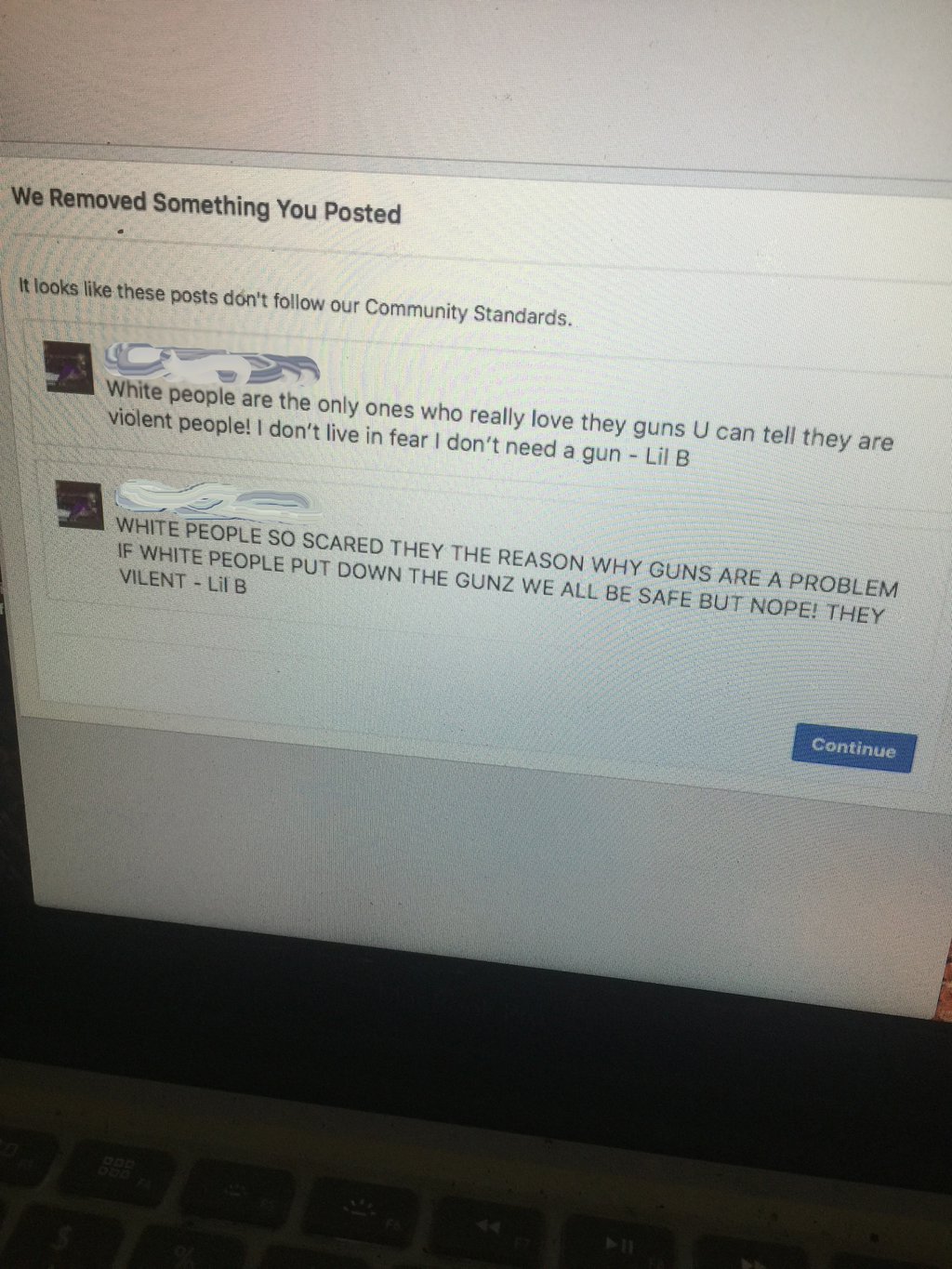Rapper Lil B Sent Us the Posts Facebook Calls ‘Hate Speech’
Credit to Author: Jordan Pearson| Date: Wed, 11 Oct 2017 20:19:15 +0000
Facebook recently banned rapper Lil B for 30 days for violating the social network’s hate speech policies, causing a furor online. On Wednesday, the Berkeley, California-based artist sent Motherboard two of the posts that Facebook removed and which led to the suspension. A Facebook spokesperson also explained why the company believes he violated its terms, calling their hate speech policies “race-neutral.”
Lil B, also known as the BasedGod, is the rare rapper who’s made universal love and positivity his entire brand. To be “based” is to live and let live, no matter what you look like. Some fans perhaps mistook his message of acceptance for one of passivity, and so were surprised (or even angered) when Lil B took to social media to discuss race in America in blunt terms—with a focus on racial double standards.
Read More: Facebook Confirms it Has Banned Rapper Lil B for ‘Hate Speech’
Lil B’s temporary ban comes at a time in which prominent black activists like DiDi Delgado have accused Facebook of preventing them from talking about systemic racism. Meanwhile, white people are finding ways to use veiled language to promote racist ideas without having their posts deleted or their accounts banned. In one search on Wednesday, Motherboard found several such posts.
For example, on October 2 Lil B highlighted on Facebook how people like far-right commentator Tomi Lahren use statistics regarding violence in inner cities as a dog whistle. With his post, Lil B was pointing out that black people don’t enjoy the same safety net that whiteness and supposedly “neutral” statistics provide when talking about race. (This post, which apparently wasn’t flagged for removal by Facebook, is still online.)

In the two now-removed posts Lil B shared with Motherboard, the rapper discusses the intersection of whiteness and gun violence in America after news broke that a white retiree had slaughtered 59 people in Las Vegas. In one post Lil B wrote, “White people are the only ones who really love they guns U can tell they are violent people!” and in another, “IF WHITE PEOPLE PUT DOWN THE GUNZ WE ALL BE SAFE BUT NOPE! THEY VILENT.” Both posts were deleted by Facebook but remain on Twitter. Facebook maintains that a 30-day ban requires at least five violations and Lil B should have been notified regarding all of them, but the rapper told me the company only alerted him to two.

In a phone interview, Facebook spokesperson Ruchika Budhraja defended the company’s decision. “I think if you were to change ‘white’ to something else, like ‘black people are the problem, they’re so violent’—if you just took a step back and replaced it with anything else, those are the type of things that our hate speech policies are intended to capture and they apply equally to all races,” Budhraja said. “They are race-neutral.”
Motherboard searched Facebook and found numerous posts implying that black people are violent to bolster various political points—although the rhetoric is often masked by references to statistics. ProPublica, reporting on internal Facebook documents in May, noted that the company has “hundreds of rules, drawing elaborate distinctions between what should and what shouldn’t be allowed,” which have resulted in “white men” being a protected group but not “black children.”
Facebook posts that Motherboard viewed used numbers about violent crime in Chicago and other cities as justification to say things like “violence is acceptable in ‘black culture'” and “black men are more likely to commit violent crimes.” For Muslims, it’s even more explicit. Facebook is full of people freely posting that Islam is an inherently violent religion.
When asked about these sorts of posts, Budhraja said that she would have to view the specific posts and run them by Facebook’s community operations team, but “I would guess that would not violate—you would have to say that black people are violent,” as opposed to just strongly insinuating it, she said.
Facebook relies on reports from users to identify hate speech, she continued, but also uses automated techniques to identify slurs. “Sometimes we make mistakes when people are trying to draw attention to things versus when they’re actually making hate speech,” Budhraja said. “We’re working on improving the system overall with more people and better technology.”
When reached for comment on Facebook’s justification for his 30-day ban, Lil B texted Motherboard the following message:
as i have lectured at some of the best institutions around the usa i felt that i was only starting a blunt but positive discussion with no hate intended. I respect facebook its policy’s and staff and would love to work together in the future on ways to combat hate as well as praise free speech and protect all people i love you thank you – Lil B
To quote from a talk Lil B gave at the Massachusetts Institute of Technology in 2014: “I might be trying to give some information, but because of how I’m perceived by the receiver, they tend to have different feelings. Which makes life beautiful.”
Get six of our favorite Motherboard stories every day by signing up for our newsletter .